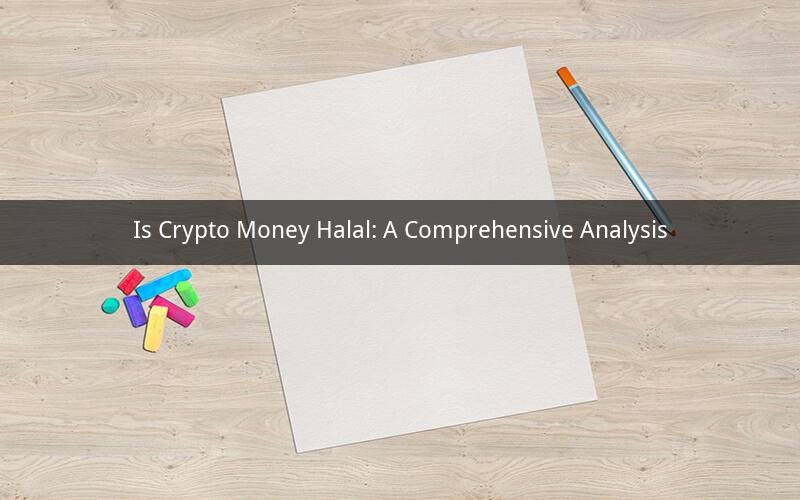
Introduction:
The rise of cryptocurrencies has sparked a heated debate on their religious and legal implications. One of the most pressing questions is whether crypto money is considered halal, or permissible, in Islam. This article delves into the various aspects surrounding this issue, providing a comprehensive analysis of the topic.
1. Understanding Halal in Islam:
In Islam, the concept of halal refers to anything that is permissible and lawful according to Islamic teachings. It encompasses various aspects of life, including food, finance, and business practices. Halal is derived from the Arabic word "halal," which means "permitted" or "lawful."
2. Islamic Principles of Finance:
Islamic finance is based on the principles of Sharia, or Islamic law. These principles emphasize fairness, transparency, and ethical practices. The key principles of Islamic finance include:
a. Prohibition of interest (riba): Islamic finance strictly prohibits the charging or receiving of interest on loans. This is because interest is considered exploitative and unfair.
b. Prohibition of speculation (gharar): Islamic finance discourages speculation and excessive risk-taking, as it goes against the principle of fairness and ethical conduct.
c. Investment in permissible activities: Islamic finance encourages investments in businesses and industries that are considered halal, such as agriculture, manufacturing, and services.
3. The Nature of Crypto Money:
Cryptocurrencies, such as Bitcoin, Ethereum, and Litecoin, are digital or virtual currencies that operate independently of a central authority. They are based on blockchain technology, a decentralized ledger system that ensures transparency and security. The nature of crypto money raises several questions regarding its compatibility with Islamic principles.
4. Arguments Against Crypto Money Being Halal:
a. Lack of Central Authority: One of the main arguments against crypto money being halal is the absence of a central authority. Islamic finance requires a central authority to oversee transactions and ensure compliance with Sharia principles. Without a central authority, it becomes challenging to regulate and monitor transactions.
b. Uncertainty of Ownership: Crypto money operates on a decentralized network, making it difficult to determine the rightful owner of the currency. This uncertainty raises concerns about the legitimacy of transactions and the possibility of fraud.
c. Potential for Speculation: The volatile nature of cryptocurrencies makes them susceptible to speculative trading. Islamic finance prohibits speculation, as it goes against the principle of fairness and ethical conduct.
5. Arguments in Favor of Crypto Money Being Halal:
a. Transparency: Blockchain technology ensures transparency in transactions, making it easier to track and verify the source of funds. This transparency aligns with the principles of Islamic finance.
b. Innovation and Efficiency: Cryptocurrencies offer a more efficient and cost-effective way of conducting transactions. This innovation can benefit Islamic finance by reducing costs and increasing accessibility.
c. Potential for Sharia-Compliant Crypto Exchanges: The emergence of Sharia-compliant crypto exchanges and platforms can address some of the concerns regarding the compatibility of crypto money with Islamic principles.
6. The Role of Islamic Financial Institutions:
Islamic financial institutions play a crucial role in determining the halal status of crypto money. These institutions can conduct thorough research and analysis to assess the compatibility of crypto money with Islamic principles. Additionally, they can develop Sharia-compliant frameworks and guidelines for the use of cryptocurrencies in Islamic finance.
7. The Future of Crypto Money in Islam:
The debate over the halal status of crypto money is likely to continue as the industry evolves. As more research and analysis are conducted, it is possible that a consensus will emerge regarding the compatibility of crypto money with Islamic principles. This consensus can lead to the development of Sharia-compliant crypto products and services that cater to the needs of Muslim investors and consumers.
Conclusion:
The question of whether crypto money is halal in Islam is a complex and multifaceted issue. While there are arguments against its compatibility with Islamic principles, there are also compelling reasons to consider it halal. As the industry continues to evolve, it is crucial for Islamic financial institutions and scholars to engage in further research and analysis to determine the halal status of crypto money and develop appropriate frameworks for its use in Islamic finance.
Questions and Answers:
1. Q: What is the main concern regarding the halal status of crypto money in Islam?
A: The main concern is the absence of a central authority to regulate and monitor transactions, as well as the potential for speculation and uncertainty of ownership.
2. Q: Can cryptocurrencies be used for Sharia-compliant investments?
A: Yes, cryptocurrencies can be used for Sharia-compliant investments, provided that they are traded on Sharia-compliant platforms and used in permissible activities.
3. Q: How can Islamic financial institutions address the challenges of integrating crypto money into Islamic finance?
A: Islamic financial institutions can conduct thorough research and analysis, develop Sharia-compliant frameworks, and collaborate with experts in the field to address the challenges of integrating crypto money into Islamic finance.
4. Q: Are there any Sharia-compliant crypto exchanges available?
A: Yes, there are several Sharia-compliant crypto exchanges and platforms that offer services to Muslim investors and consumers.
5. Q: What is the future of crypto money in the context of Islamic finance?
A: The future of crypto money in Islamic finance is uncertain but promising. As more research and analysis are conducted, it is possible that a consensus will emerge regarding its compatibility with Islamic principles, leading to the development of Sharia-compliant crypto products and services.